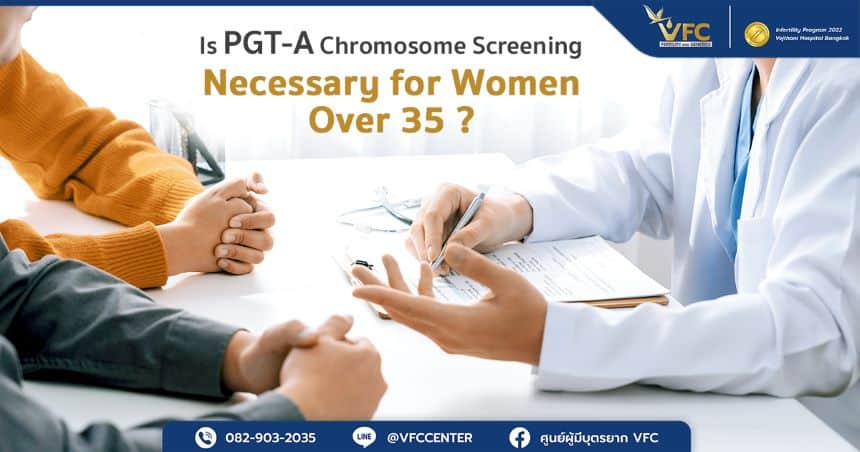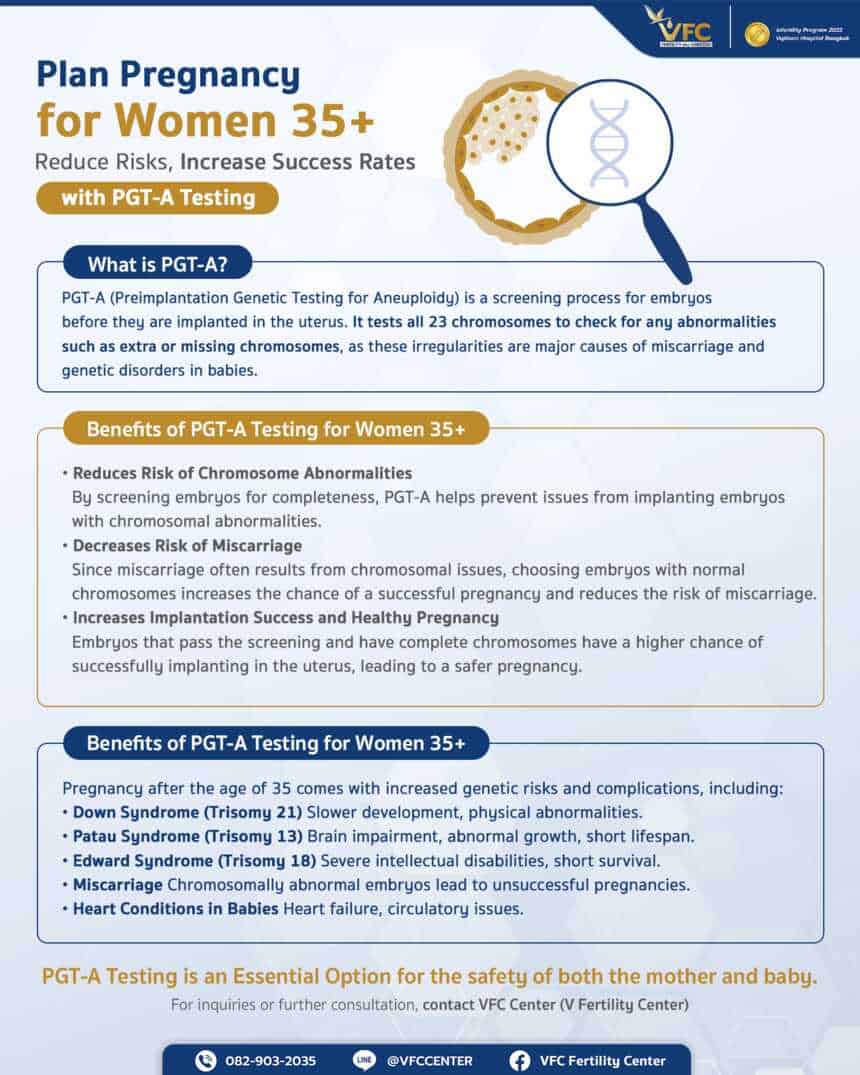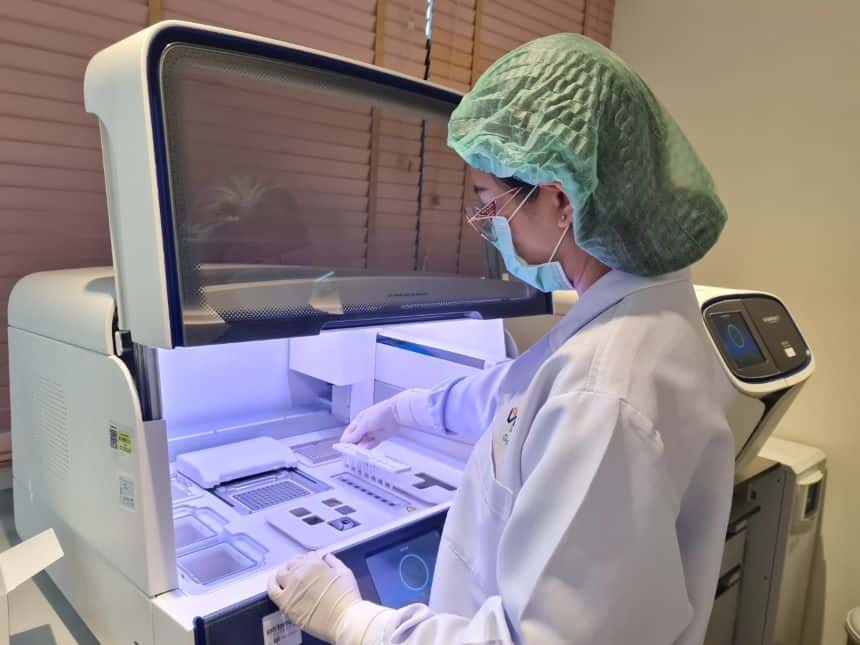
Pregnancy at an older age is a concern for many couples. As women age, the risk of infertility and genetic disorders increases. Specifically, for women over the age of 35, the chance of genetic abnormalities in embryos also rises. This is why embryo chromosome screening or PGT-A (Preimplantation Genetic Testing for Aneuploidy) has become an important option to enhance pregnancy success and reduce the risk of miscarriage caused by embryos with genetic abnormalities.

What is PGT-A Chromosome Screening?
PGT-A (Preimplantation Genetic Testing for Aneuploidy) or chromosome screening for embryos is a process used to screen genetic abnormalities in embryos. This test screens all 23 pairs of chromosomes to detect any abnormalities that may affect the long-term development of the baby, such as Down Syndrome, Patau Syndrome, and Edward Syndrome, which are common genetic disorders.
PGT-A helps select embryos with normal chromosomes before implantation into the uterus. This reduces the risk of genetic abnormalities and increases the chance of a healthy pregnancy.
Why is PGT-A Important for Women Over 35?
As women age, their egg production decreases, making them more susceptible to genetic changes in their eggs. These changes can include having extra or missing chromosomes, leading to genetic abnormalities in embryos. Therefore, PGT-A chromosome screening is crucial for women over 35 for the following reasons:
1. Reduces the Chance of Genetic Abnormalities in Embryos
As women age beyond 35, the likelihood of embryos having genetic abnormalities increases, especially for conditions that could cause developmental issues in the baby. PGT-A chromosome screening helps select embryos with good quality, reducing the risk of obtaining embryos with chromosomal abnormalities that could negatively affect the baby.
2. Reduces the Risk of Miscarriage
PGT-A not only helps select embryos with normal chromosomes, but also reduces the risk of miscarriage caused by embryos with abnormal chromosomes. It ensures that only genetically healthy embryos are chosen, which increases the chances of successful implantation and a full-term pregnancy.
3. Increases the Chance of Embryo Implantation
Embryos with normal chromosomes have a higher chance of successfully implanting in the uterus. By screening for chromosomes, PGT-A ensures a smoother implantation process, thus increasing the likelihood of a successful pregnancy.
Potential Impacts on the Baby from Pregnancy in Women Over 35
Pregnancy in women over 35 carries higher risks compared to younger women, as it can lead to various complications that affect the health of the baby. The risks arise from health factors and genetic changes that naturally occur with age. These risks include:
1. Down Syndrome (Trisomy 21)
Down Syndrome or Trisomy 21, is a genetic disorder caused by an extra chromosome 21. This results in developmental delays and distinct physical characteristics, such as a flat face, upward slanting eyes, and small hands and feet. For women over 35, the risk of Down Syndrome increases.
2. Miscarriage
Miscarriage or the loss of pregnancy in the early stages is one of the most common complications in women over 35. This occurs when the pregnancy process is not completed properly, often due to chromosomal abnormalities in the embryo, such as extra or missing chromosomes. This not only affects the embryo but also impacts the mother’s health directly.
3. Patau Syndrome (Trisomy 13)
Patau Syndrome or Trisomy 13, occurs when there is an extra chromosome 13. This results in severe complications such as brain problems that prevent normal development or incomplete growth. Generally, babies born with Patau Syndrome survive only a few months or may pass away shortly due to related complications.
4. Edward Syndrome (Trisomy 18)
Edward Syndrome or Trisomy 18, is a genetic disorder caused by an extra chromosome 18 This is a severe genetic condition that causes both brain and growth development issues, leading to significant cognitive impairment. Babies born with Edward Syndrome often have a life expectancy of only a few weeks or less than a year due to severe complications.

5. Heart Disease in Infants
Heart defects in infants are abnormalities related to the structure or function of the heart. These defects may be caused by genetic abnormalities, leading to heart failure or problems with blood circulation in the baby.
Given these risks, pregnancy planning for women over 35 should involve close monitoring to prevent complications for both the mother and the baby. In-depth tests, such as PGT-A chromosome screening, along with ongoing care, will improve the chances of a safe and successful pregnancy.
PGT-A or chromosome screening is an important choice for couples planning to have children, especially for those over 35. It increases the chances of a healthy pregnancy, reduces the risk of miscarriage, and prevents genetic disorders from being passed on to the baby. If you’re interested in PGT-A or have any questions about it, you can consult with VFC Center (V Fertility Center). Our center is dedicated to supporting couples with fertility assessments and personalized care to ensure a successful pregnancy plan. For those specifically seeking PGT-A in Thailand, we provide expert guidance and advanced screening options tailored to your needs.
Contact or Book a Consultation:
VFC Center – V Fertility Center
Hotline: 082-903-2035
LINE Official: @vfccenter

The team of specialists in obstetrics and gynecology and reproductive medicine





No Comments
Sorry, the comment form is closed at this time.